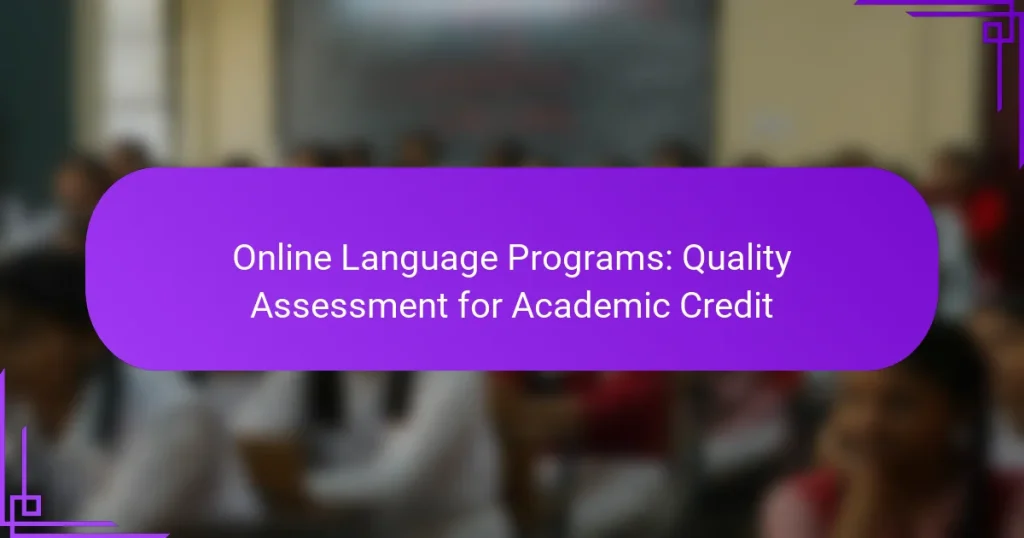As online language programs gain popularity, assessing their quality for academic credit becomes essential. Key factors such as accreditation, course content, instructor qualifications, and student feedback are vital in determining the effectiveness of these programs. With many options available, students can find flexible and credible pathways to enhance their language skills while meeting academic requirements.

How to assess quality in online language programs for academic credit?
To assess the quality of online language programs for academic credit, consider accreditation, course content, instructor qualifications, and student feedback. Each of these factors plays a crucial role in determining the program’s credibility and effectiveness in delivering language education.
Accreditation standards
Accreditation is a key indicator of quality in online language programs. Look for programs accredited by recognized bodies, such as regional accrediting organizations in the U.S. or national agencies in other countries. Accreditation ensures that the program meets specific educational standards and is recognized by other institutions.
Check if the program is affiliated with reputable universities or institutions, as this can enhance its credibility. Additionally, verify if the accreditation is current and applicable to the specific language courses offered.
Course content evaluation
Evaluating course content is essential to ensure it aligns with academic standards and learning objectives. Review the syllabus for topics covered, the depth of material, and the balance between grammar, vocabulary, and practical usage. A well-structured program should include assessments and opportunities for real-world application.
Consider programs that offer a variety of learning materials, such as multimedia resources, interactive exercises, and cultural context. This diversity can enhance engagement and retention of language skills.
Instructor qualifications
Instructor qualifications significantly impact the quality of online language programs. Look for instructors with relevant degrees in linguistics or education, as well as certifications in language instruction. Experience teaching online is also a valuable asset, as it indicates familiarity with digital learning environments.
Inquire about the instructor’s language proficiency and teaching methods. Programs that provide instructor bios or allow for introductory sessions can help you assess their suitability for your learning needs.
Student feedback analysis
Analyzing student feedback is a practical way to gauge the effectiveness of an online language program. Look for reviews on independent platforms or forums to gather diverse opinions. Pay attention to comments about course structure, instructor responsiveness, and overall satisfaction.
Consider trends in feedback rather than isolated reviews. If a significant number of students report positive or negative experiences, it can provide insight into the program’s strengths and weaknesses. Additionally, check for any accreditation-related complaints or issues raised by former students.

What are the top online language programs recognized for academic credit?
Several online language programs are recognized for academic credit, providing students with flexible options to enhance their language skills. These programs often align with educational standards and can be integrated into degree requirements or used for personal development.
Duolingo English Test
The Duolingo English Test is an accessible online assessment that evaluates English proficiency. It is widely accepted by universities and colleges, especially in the United States, as a reliable measure of language skills for admission purposes.
To take the test, students complete a series of interactive tasks within about an hour. The results are available within a few days, making it a quick option for those needing to demonstrate their English abilities. Ensure that the institutions you are applying to accept this test as part of their admissions criteria.
Rosetta Stone Academic Program
The Rosetta Stone Academic Program offers comprehensive language learning solutions that are often used in educational settings. This program provides a structured approach to learning various languages through immersive techniques and interactive lessons.
Institutions can purchase licenses for their students, allowing them to access the platform for a specified period. The program is designed to align with academic standards, making it suitable for credit-bearing courses. Check if your school has a partnership with Rosetta Stone to take advantage of potential discounts or free access.
Coursera language courses
Coursera offers a variety of language courses from accredited universities, which can be taken for academic credit. These courses cover multiple languages and often include assessments that contribute to a learner’s overall grade.
Students can enroll in courses that fit their schedule and learning pace, with many options available for free or at a low cost. Be sure to verify if the specific course you choose is eligible for credit transfer to your institution, as policies may vary widely.

How do online language programs compare to traditional language courses?
Online language programs offer a different approach to learning compared to traditional courses, emphasizing flexibility and accessibility. While both methods aim to teach language skills, online programs often provide more convenience and cost savings, appealing to a wider range of learners.
Flexibility and accessibility
Online language programs typically allow learners to study at their own pace and on their own schedule. This flexibility is particularly beneficial for individuals balancing work, family, or other commitments. Many platforms offer mobile access, enabling users to learn from anywhere with an internet connection.
In contrast, traditional courses usually follow a fixed timetable, requiring students to attend classes at specific times. This can limit participation for those with rigid schedules or geographical constraints.
Cost-effectiveness
Online language programs often come at a lower price point than traditional courses, making them more accessible to a broader audience. Costs can vary widely, but many online options range from free resources to subscriptions costing between $10 to $50 per month.
Traditional language courses may involve additional expenses such as commuting, materials, and facility fees, which can add up significantly. For budget-conscious learners, online options present a compelling alternative.
Learning outcomes
The effectiveness of online language programs can vary based on the quality of the content and the learner’s commitment. Many reputable online platforms employ interactive tools, quizzes, and real-time feedback to enhance learning outcomes. However, self-directed learning requires discipline and motivation.
Traditional courses often provide structured environments with direct interaction from instructors, which can facilitate deeper understanding and immediate clarification of doubts. Consider your personal learning style when choosing between the two formats to ensure the best outcomes for your language acquisition goals.

What criteria should be used to select an online language program?
When selecting an online language program, consider factors such as program accreditation, curriculum relevance, and the availability of support services. These criteria help ensure that the program meets educational standards and effectively supports your learning needs.
Program accreditation
Accreditation indicates that a language program meets specific educational standards set by recognized authorities. Look for programs accredited by reputable organizations or institutions, as this can enhance the credibility of your qualifications.
Check if the program is recognized by local educational bodies or international organizations. For example, in the U.S., accreditation from agencies recognized by the Department of Education is a strong indicator of quality.
Curriculum relevance
The curriculum should align with your learning goals and the language skills you wish to develop. Assess whether the program offers courses that cover essential areas such as speaking, writing, listening, and cultural context.
Consider programs that provide practical applications of language skills, such as conversation practice or real-world scenarios. A well-rounded curriculum often includes assessments and projects that reinforce learning.
Support services availability
Access to support services can significantly enhance your learning experience. Look for programs that offer tutoring, language exchange opportunities, and technical support to assist you throughout your studies.
Many successful online programs provide forums or chat services where you can connect with instructors and peers. This interaction can help clarify doubts and foster a sense of community, which is vital for language learning.

How can students earn academic credit through online language programs?
Students can earn academic credit through online language programs by enrolling in accredited courses that meet specific educational standards. These programs often offer assessments and partnerships with universities to facilitate credit transfer.
Credit transfer policies
Credit transfer policies vary by institution and can significantly impact how online language program credits are recognized. Students should check with their home institution to understand which online courses are eligible for credit transfer and any limitations that may apply.
Many universities have established agreements with online language programs, allowing for smoother credit transfers. It’s advisable to obtain written confirmation of credit acceptance before enrolling in a course to avoid surprises later.
Assessment methods
Assessment methods in online language programs typically include quizzes, exams, and project-based evaluations. These assessments are designed to measure language proficiency and ensure that students meet the necessary learning outcomes.
Some programs may also incorporate standardized tests, such as the ACTFL OPI or CEFR assessments, which can provide a recognized measure of language skills. Students should inquire about the assessment methods used to ensure they align with their academic goals.
Partnerships with universities
Partnerships with universities can enhance the credibility of online language programs and facilitate the credit transfer process. Many reputable online programs collaborate with accredited institutions to offer courses that are pre-approved for credit.
Students should look for programs that explicitly state their university partnerships and any accreditation they hold. This information can help ensure that the credits earned will be recognized by their home institution and contribute toward their degree requirements.

What are the emerging trends in online language education?
Emerging trends in online language education include personalized learning experiences, the integration of artificial intelligence, and an increasing focus on cultural immersion. These trends aim to enhance engagement and effectiveness in language acquisition.
Personalized Learning Experiences
Personalized learning experiences tailor language instruction to individual student needs, preferences, and learning paces. This approach often utilizes adaptive learning technologies that adjust content based on performance and engagement levels.
For example, platforms may offer customized lesson plans, targeted exercises, and feedback mechanisms that cater to the learner’s specific challenges. This can significantly improve retention and motivation.
Integration of Artificial Intelligence
Artificial intelligence (AI) is increasingly being used to enhance online language education. AI-driven tools can provide instant feedback, analyze speech patterns, and offer conversational practice with virtual tutors.
These technologies can help learners improve their pronunciation and fluency in real-time, making the learning process more interactive and efficient. Additionally, AI can assist in creating more engaging and relevant content based on user interests.
Focus on Cultural Immersion
Cultural immersion in online language programs is becoming more prevalent, emphasizing the importance of understanding cultural contexts in language learning. This trend includes virtual exchanges, cultural workshops, and multimedia resources that expose learners to authentic cultural experiences.
By integrating cultural elements, such as music, cuisine, and traditions, learners can gain a deeper appreciation for the language and its speakers. This holistic approach not only enhances language skills but also fosters global awareness and empathy.


